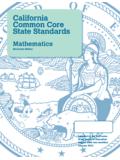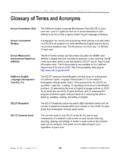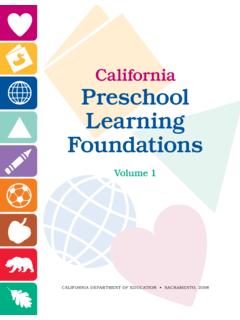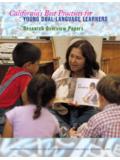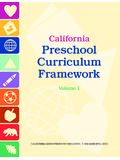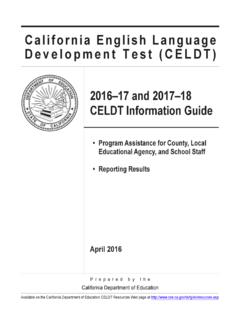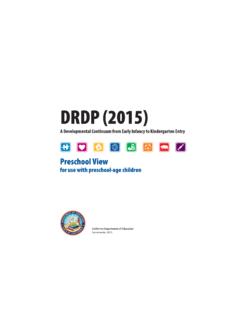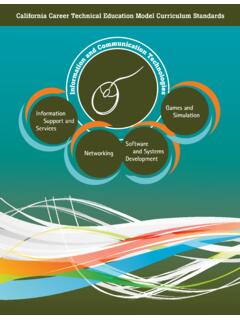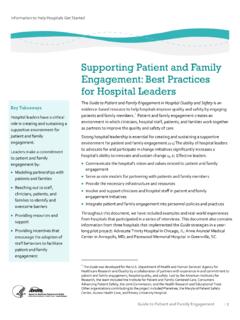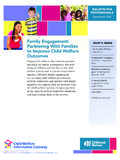Transcription of Family Engagement Framework - California Department of ...
1 Family Engagement Framework A TOOL F OR C ALI F OR NI A S C HOOL DI S TR I C TS. California Department of Education SACRAMENTO 2 0 1 4. Family Engagement Framework A TO OL F OR C ALI F OR NI A S C HOOL DI S TR I C TS. California Department of Education SACRAM E NTO 2 0 1 4. This edition of the Family Engagement Framework was revised by the California Department of Education (CDE) in collaboration with the WestEd Center for Prevention and Early Intervention (CPEI) under a contract with the Californians Dedicated to Education Foundation (CDEF) with funding support from the Heising-Simons Foundation. The Center for Prevention and Early Intervention provides training and technical assistance in policy development, translation of research to practice, systems evaluation, and implementation of evidence-based practices to promote a comprehensive approach to improving developmental, academic, and behavioral outcomes for all children and youth.
2 The publication was originally developed by the CDE in collaboration with the California Comprehensive Center (CA CC) at WestEd. Foundational content and support were provided by the Family Area Network, an informal advisory body to the former Title I Accountability and Partnerships Office at the CDE. The original work was supported by CA CC at WestEd through funding from the Department of Education, PR/Award Number S283B050032. It does not necessarily reflect the views or policies of the Department of Education, and readers should not assume endorsement by the federal government. The California Comprehensive Center a partnership of lead agency WestEd and the American Institutes for Research and School Services of California is part of a federal network of 16 regional comprehensive centers.
3 Revision and Production Team: CDE. Nancy Bodenhausen, Education Programs Consultant,Title I Policy and Program Guidance Office CPEI. Angela McGuire, Primary Writer Carolyn Walker, Editor Acknowledgements to the Original Production Team: CDE. Deb Sigman, Deputy Superintendent, Curriculum, Learning, and Accountability Branch Carol Dickson, Education Programs Consultant,Title I Accountability and Partnerships Office CA CC. Virginia Reynolds,Task Lead Angela McGuire, Primary Writer Janice Lowen Agee, Editor Carolyn Walker, Editor Kelley Versteegh, Graphic Designer Copyright 2014 California Department of Education. Permission to reproduce with the California Department of Education copyright notice is hereby granted. Family Engagement Framework 1. Table of Contents Message from the State Superintendent of Public Instruction.
4 3. Introduction .. 5. District Principles .. 9. Required District Activities and Implementation Rubrics Build Capacity.. 11. Demonstrate Leadership .. 15. Resources: Fiscal and Other .. 17. Monitor Progress .. 18. Access and Equity .. 20. Tools for Communicating with families .. 23. Appendixes Appendix A: Matrix of Federal and State Parent Involvement Code and Regulations .. 37. Appendix B: Linking Parent Involvement to Student Achievement: A Review of Recent Literature .. 39. Annotated List of Selected Articles Linking Parent Involvement to Student Achievement .. 45. References .. 49. Family Engagement Activities (plain text version) .. 50. Family Engagement Framework 3. Message from the State Superintendent of Public Instruction Those of us in the education community know that Family Engagement is one of the single most important factors in helping students succeed in school.
5 Parents, families , and other caring adults provide the primary educational environment for children early in life and can reinforce classroom learning throughout the school is why the California Department of Education (CDE) supports and encourages Family Engagement , and it is why I am pleased to release this updated Family Engagement Framework ( Framework ). The Framework is a joint project of the CDE and WestEd. It brings together re- search, requirements, and promising practices. It is a tool for leaders in school districts and county offices of education to use as they work with schools, families , and communities to plan, implement, and evaluate Family Engagement practices that directly impact improved student achievement. The implementation of the Local Control Funding Formula (LCFF) has placed a renewed emphasis on families and educators working together as revisions to this Framework include updates to state and federal program require- ments where Family Engagement is a vital component, including those under the new LCFF.
6 And for the first time, the entire Framework is available in Spanish to reach even more families who want to fully participate in their child's learning. At the core of the Framework are district principles that were developed collabora- tively with input from a wide variety of parent, education, and community organi- principles describe expectations, or standards, for districts to engage Family members in supporting their children's principles address capacity building, leadership, resource allocation, progress monitoring, access, and equity. Implementation activities are provided for each district principle, with legal references cited where appropriate. Please share this resource with your schools and wider communities to strengthen involvement and build relationships among critical partners in the education of California 's students.
7 Tom Torlakson . 4 Family Engagement Framework Family Engagement Framework 5. Introduction Purpose In support of establishing strong, healthy, and systematic National Network of Partnership Schools at Johns Hopkins school, Family , and community partnerships statewide, University (Epstein, 2002): (1) parenting, (2) communi- the California Department of Education (CDE) engaged cating, (3) volunteering, (4) learning at home, (5) decision the assistance of the California Comprehensive Center at making, and (6) collaborating with the community. WestEd (CA CC) to develop a tool describing expecta- The draft Standards addressed all levels (state, regional, tions and implementation strategies for integrated Family county, district, school, classroom, and Family ) of the Engagement within state educational Family educational system and identified opportunities to Engagement Framework is intended to provide guidance to strengthen school, Family , and community partnerships educators, districts, schools, families , and communities through leadership, capacity building, and as they plan, implement, and evaluate strategies across accountability.
8 Although stakeholders, including parent multiple programs for effective Family Engagement to leaders, teachers, school and district administrators, and support student achievement and close the academic professional associations, expressed a need and apprecia- achievement gap. tion for the Standards, they suggested that the guidance should be provided in a more concise format. Development In 2006, CDE, with the assistance of the CA CC, began to In 2003, the Family Area Network (FAN) Board, an analyze and revise the draft Standards. After several months informal advisory body to the CDE Title I Accountability of discussion, editing, and reorganization, the Family and Partnerships Office, engaged parent and educational Engagement Framework ( Framework ) was conceptualized.
9 Leaders in developing a set of draft Model Standards for National educational policies continued to emphasize the Family Involvement (Standards) grounded in legal statute and importance of establishing programs to involve families academic draft Standards were aligned with and practices to empower and engage families in the six types of parent involvement described in the model educational process ( Department of Education [ED], for school, Family , and community partnerships from the 2010). Over the next several years, additional activities Family Engagement Framework Principles Reference program requirements as well as six types of parent involvement. Differentiate for each level of education implementation, such as district and school. Address five domains: capacity building, leadership, resources, progress monitoring, and equity.
10 Required District Implementation Rubrics Tools for Communicating Activities Reflect FAN draft Standards. with families Incorporate federal and Plan and evaluate. Are reproducible or state laws and regulations. Link to research and adaptable. promising practices. May be disseminated in print or via the Internet. 6 Family Engagement Framework were conducted to ensure that the Framework addressed state the local educational agency (LEA) provides, as and federal requirements and integrated recent research required by law. and useful resources. CA CC staff conducted an extensive VII .Teaching and Learning . Participants receive review of the California Education Code (EC) and pertinent core and categorical program services that meet regulations for CDE programs to identify requirements their assessed needs.
